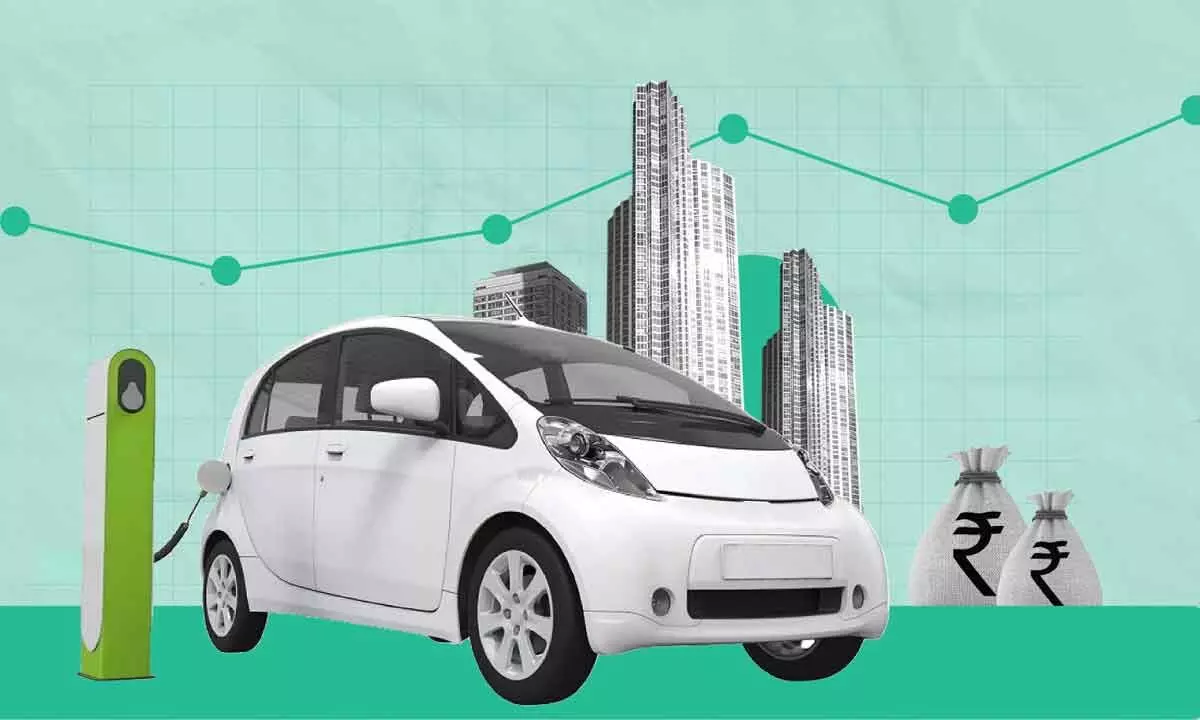EVs are seemingly here to stay
Porsche recently unveiled a revolutionary world first- a water-powered car
image for illustrative purpose

The discovery of 5.9 million tonnes of lithium reserves in Jammu and Kashmir is a significant development for the country's electric vehicle industry. Lithium is a critical component in the production of batteries used in electric vehicles, and currently, India relies heavily on imports for its lithium requirements
India's domestic electric vehicle industry will develop at a 94.4 percent compound annual growth rate (CAGR) between 2022 and 2030, reaching 10 million sales every year by that point, states the Economic Survey 2023.
One of the main challenges is the need to address the problem of charging and bring about infrastructure in that direction. While the government has announced plans to set up charging stations across the country, the progress has been slow, and many potential buyers are deterred by the fear of running short of charging during a long journey.
While the prices of electric vehicles have been coming down in recent years, they are still more expensive than their petrol or diesel counterparts. This makes them less accessible to the average consumer.
Finally, the range of electric vehicles still needs to be improved, which makes them unsuitable for long-distance travel. While this is less of an issue for urban commuters, it remains a significant concern for those who need to travel long distances.
Despite the challenges, there are indications that the future of transportation in India could be electric. The government has set a target of achieving 30% electric vehicle replacement by 2030, and several manufacturers have announced plans to launch electric vehicles in the coming years.
Further, the discovery of 5.9 million tonnes of lithium reserves in Jammu and Kashmir is a significant development for the country's electric vehicle industry. Lithium is a critical component in the production of batteries used in electric vehicles, and currently, India relies heavily on imports for its lithium requirements. The discovery of these reserves is expected to significantly reduce India's dependence on imports and make electric vehicles more affordable and accessible to the masses.
The Tata Group is in the forefront of developing EV vehicles. Tata Motors is driving towards overall sales of over 80,000 EVs in FY2024. Their investment of over £4 billion is an integral part of the Tata group’s commitment to electric mobility and renewable energy storage solutions and establishes a competitive green tech ecosystem in the UK at scale. The group will be setting up one of Europe's largest battery cell manufacturing facilities in the UK.
The battery gigafactory will produce high-quality, high-performance, sustainable battery cells and packs for a variety of applications within the mobility and energy sectors. The company’s strategic growth plans for its flexible manufacturing capacity will begin with a rapid ramp-up phase and the start of production in 2026.The gigafactory intends to maximise its renewable energy mix, with an ambition for 100% clean power.
Maruti, the biggest carmaker in India is getting its act together and will be showcasing its vehicles in 2025.
EVs may be one of the most popular eco-friendly cars. A recent AAA survey claims that one in five U.S. drivers will likely consider an EV for their next car purchase. The undeniable pop culture presence of the Tesla brand and its CEO, Elon Musk, may have something to do with the widespread awareness.
Instead of a gas tank and an engine, EVs have a battery and an electric motor. These cars have zero tailpipe emissions and boast of the highest miles per gallon gasoline equivalent (MPGe).
However, charging EV batteries may possibly contribute to air pollution. The electricity has to come from somewhere, and it’s not always going to be sustainable. Porsche, recently unveiled a revolutionary experiment – a water-powered car. This was a world first. It was a bold and ambitious move for Porsche, which promised to revolutionize the automotive industry for years to come.
Synthetic fuel is a liquid fuel that is made from water. It is created through a process that extracts CO2 from the air. The CO2 is combined with H2O to produce syngas, a mixture of CO and H that is then converted into synthetic fuels.
The key advantage of this technology is that it converts a waste product into fuel. CO2 is released during the combustion of fossil fuels, and it is considered a pollutant as it contributes to climate change. By converting CO2 into a usable product, synthetic fuel technology reduces the amount of CO2 in the atmosphere.
The technology behind synthetic fuel is very efficient, and it is possible to produce a significant amount of fuel from a limited amount of CO2. This is possible because water and CO2 are abundantly available resources.
Synthetic fuel is therefore an attractive alternative for transporting goods over long distances. It has the potential to significantly reduce the need for fossil fuels and improve our overall carbon footprint.

